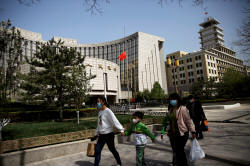|
Those banks must meet specific total loss-absorbing capacity (TLAC)
targets from 2025, the People's Bank of China (PBOC), the China
Banking and Insurance Regulatory Commission (CBIRC) and the
Ministry of Finance said in a joint statement.
China's top four lenders - Industrial and Commercial Bank of
China, Agricultural Bank of China Ltd, Bank of China and China
Construction Bank - are designated as global systemically
important banks by Chinese regulators and the Switzerland-based
Financial Stability Board (FSB).
The move is aimed at improving the risk-disposal mechanism at
big Chinese lenders, controlling irrational business expansion
and curbing the accumulation of systemic risks, the regulators
said.
The new rules require that the four banks in China hold a TLAC
amount of at least 16% of risk-weighted assets starting Jan 1,
2025, and the bar will be further raised to 18% from Jan. 1,
2028.
The four systemically important lenders are also required to
meet the leverage ratio requirement of 6% in early 2025, and
reach 6.75% in early 2028.
The regulatory requirements have been put in place in response
to a global standard of TLAC requirements for systemically
important banks, to avoid any future bailouts that would
mobilize too much of public resources, and to effectively
resolve the problem of the "too big to fail", Chinese regulators
said.
With follow-up policies in the works, "China's global
systemically important banks can meet those requirements under
relatively low pressure ... and the (requirement) will not
effect their capability in credit supply," the regulators said.
(Reporting by Cheng Leng and Ryan Woo; editing by John
Stonestreet and Susan Fenton)
[© 2021 Thomson Reuters. All rights
reserved.] Copyright 2021 Reuters. All rights reserved. This material may not be published,
broadcast, rewritten or redistributed.
Thompson Reuters is solely responsible for this content.

|
|





